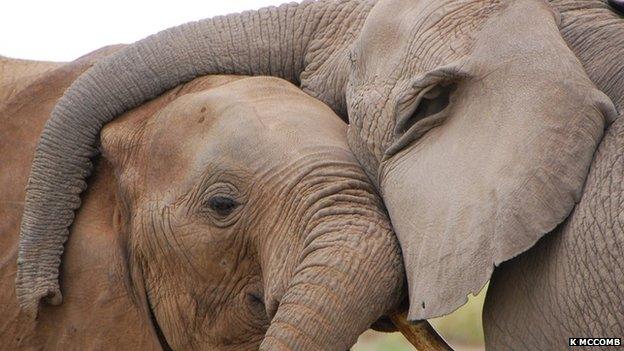Elephant society 'still disrupted decades after cull'
- Published

African elephants live in close-knit groups led by a matriarch
African elephants' decision-making abilities are left impaired by culling operations that ended decades ago, University of Sussex research suggests.
A study found that elephant herds that lost adults to culls during the 1970s and 1980s were less able to respond appropriately to other elephant calls.
Lead researcher Prof Karen McComb said the animals' "social understanding" had been impaired by the loss of adults.
The results are published in the journal Frontiers in Zoology, external.
Prof Karen McComb explains how the team tested the elephants reactions
The scientists, from the University of Sussex, say this is the first "systematic evidence that fundamental social skills may be significantly impaired by man-made disruption".
To study this, the researchers compared the behaviour of two herds of elephants: those in the Amboseli National Park, in Kenya, which have been relatively undisturbed by culling operations and a population in Pilanesberg National Park, South Africa.
The herd at Pilanesberg was made up of young orphaned elephants introduced during the early 1980s and 1990s, after management culls of adult and older juvenile animals in the Kruger National Park.
There is already evidence that the loss of these adult elephants had dramatic social consequences on South Africa's elephants; the researchers describe these effects as akin to post traumatic stress disorder.
In two protected areas in South Africa, Prof McComb told BBC News, "young, orphaned male elephants became hyper-aggressive and attacked and killed rhinoceroses".
Elephant playback
Dr Graeme Shannon, who led this study, used sound to test the animals' social understanding - playing recordings of other elephants calls to monitor their response.
When Amboseli elephants heard the call of an unfamiliar elephant, they reacted in a defensive way - bunching together and moving towards the sound.
This, Prof McComb explained is an appropriate response. "It's what elephants should do when faced with a genuine stranger," she said.
Equally appropriately, Amboseli elephants "remain relaxed when faced with the calls of more familiar animals".
In Pilanesberg, by contrast, the elephants' reactions were "completely random".
"There was no pattern at all to their responses," Prof McComb told BBC News, suggesting that these elephants could not tell the difference between friend and foe.
"This really suggests that the breakdown in their social fabric, even though it occurred decades ago, has had a real effect on their decision-making processes," she added.
"Their social understanding has been impaired."
Their second playback experiment reinforced this conclusion, revealing that the Pilanesberg elephants did not distinguish between the call of a mature, dominant elephant and that of a much less threatening youngster.
African elephants can live for up to 70 years and form close-knit groups that are dominated by a matriarch. So the researchers say that the loss of experienced adults can have long-term negative consequences on a herd.
This, they add, is "the first direct evidence" that these important social abilities in elephants are "severely compromised" in animals that had been separated from family members decades before.
Richard Byrne, professor of evolutionary psychology at the University of St Andrews, said this was a "very important piece of work".
He told BBC News: "By probing directly into the social knowledge of elephants years after translocations shows that the long-term unfortunate effects have indeed not been underestimated.
"I hope the results will be taken into account in any further plans to cull locally 'unwanted' elephants."
- Published11 October 2013
- Published15 January 2013
- Published12 December 2012